Ancillary Services
The opening of Ontario’s nodal market has been marked by real-time volatility and unusually high operating reserve prices.
ERCOT stakeholders advanced a protocol change that provides longer-duration ancillary services and state-of-charge parameters, among several other voting items, during their last TAC meeting.
President Donald Trump’s policies and the growth in demand from data centers and other new customers have changed the trajectory of the power system, speakers said at the Energy Future Forum.
PJM’s Market Implementation Committee discussed a proposal to revise its governing documents to allow DR resources to participate in the regulation market when there may be energy injected at the customer’s point of interconnection
The NEPOOL Participants Committee voted to support an expedited filing adjusting several key dates in ISO-NE’s compliance proposal for FERC Order 2023.
The PJM Markets and Reliability Committee endorsed a proposal to rework how resources are compensated for providing black start service the RTO says will provide more predictable revenues for participating market sellers.
The committees are expected to vote on manual revisions and hear a proposal to rework how resources providing black start service are compensated.
Two power industry CEOs at the Gulf Coast Power Association’s spring conference offered two different takes on ERCOT load growth over the rest of the decade — and how the sector should deal with a potential doubling of peak demand by 2031.
ERCOT is poised to start testing real time co-optimization of energy and ancillary services in a few weeks and bring the change live this December, which will mark the biggest paradigm shift in Texas' wholesale markets in 15 years.
ACP released a report produced by The Brattle Group laying out how organized markets can replicate the success CAISO and ERCOT have had in deploying energy storage resources.
Want more? Advanced Search










